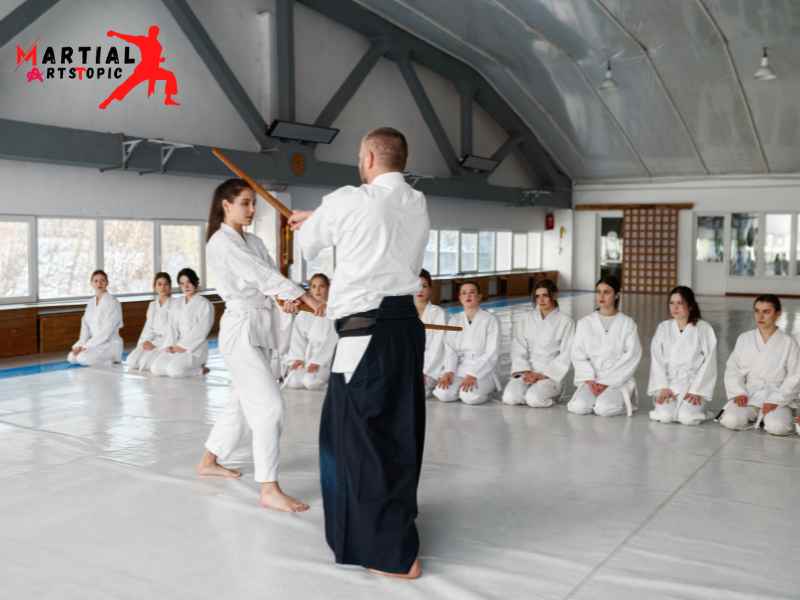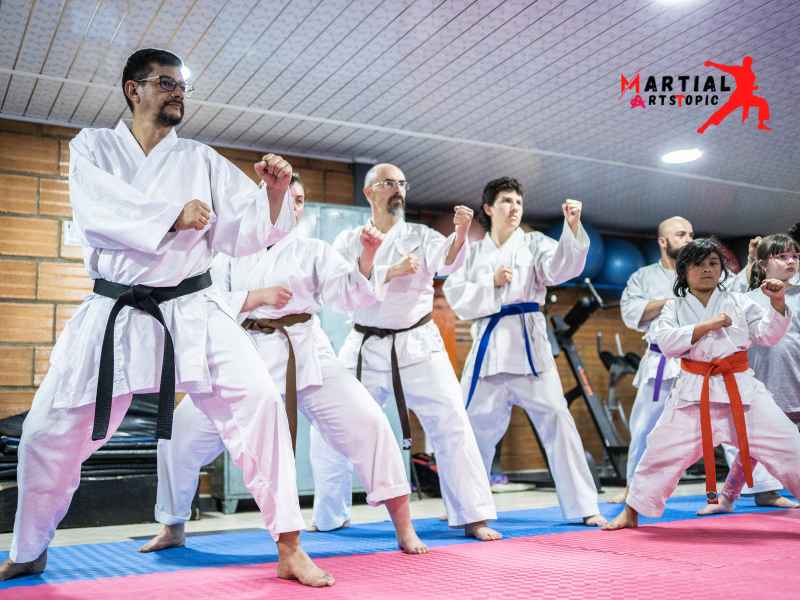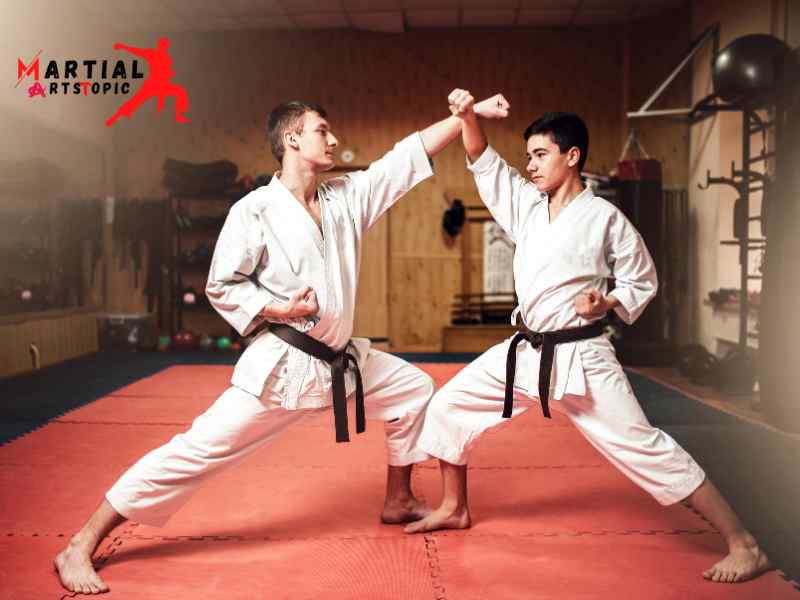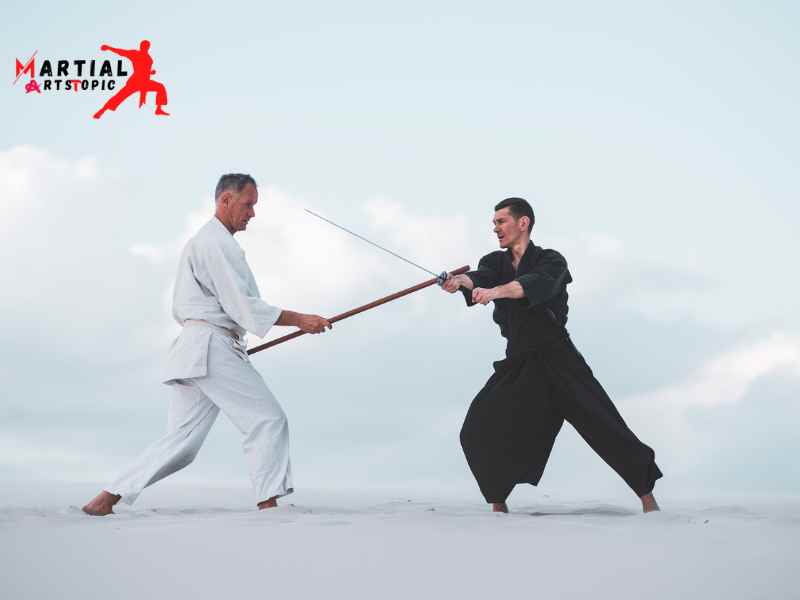
Unveiling the Secrets of Samurai Karate
What is Samurai Karate? Unveiling the Secrets of Samurai Karate. Are you ready to tap into your true potential and awaken your inner warrior? Look no further than the ancient art of Samurai Karate. With its rich history and powerful techniques, Samurai Karate is not just a martial art – it’s a way of life that can transform your mind, body, and spirit.
What is Samurai Karate?
What is Samurai Karate? Samurai Karate, also known as Bushido Karate, is a traditional Japanese martial art that dates back centuries. Something deeply rooted it in the samurai warrior culture, emphasizing discipline, honor, and self-development. Through rigorous training and dedication, practitioners of Samurai Karate can unlock their inner strength and unleash their true potential.
Unlock the Secrets of Samurai Karate
Samurai Karate goes beyond physical combat techniques. It is a holistic practice that nurtures the mind, body, and spirit. By delving into the secrets of the Samurai Karate, you can gain valuable insights and skills that can be applied not only in the dojo but also in your everyday life.
- Discipline and Focus: In Samurai Karate, discipline is key. Through repetitive training and strict adherence to techniques, you can cultivate discipline and focus, allowing you to stay present and focused on your goals both in and out of the dojo.
- Self-Defense Skills: Samurai Karate equips you with practical self-defense skills that can empower you to protect yourself and your loved ones. With its emphasis on effective striking techniques, joint locks, and throws, you can develop the confidence and ability to handle any threatening situation.
- Mental Resilience: Samurai Karate is not just about physical strength but also mental resilience. By challenging yourself in training, you can develop mental toughness, perseverance, and the ability to overcome adversity – qualities that are invaluable in all aspects of life.
- Physical Fitness: Engaging in Samurai Karate is a fantastic way to improve your physical fitness. The dynamic movements, kicks, and punches involved in training can enhance your cardiovascular health, strength, flexibility, and coordination.
- Stress Relief: In today’s fast-paced world, stress has become a common companion. Samurai Karate offers a sanctuary where you can release stress and tension. The focused training and mindfulness involved in Samurai Karate help clear the mind, leaving you feeling refreshed, rejuvenated, and ready to take on life’s challenges.
Start Your Samurai Karate Journey Today

Whether you’re a beginner or an experienced martial artist, Samurai Karate welcomes all who seek to uncover their inner warrior. Find a reputable dojo or instructor near you and embark on a transformative journey of self-discovery.
Through dedicated training, you can unlock the secrets of the Samurai Karate and tap into your true potential. Embrace the discipline, honor, and self-development that this ancient art offers, and watch as you transform into a stronger, more confident, and empowered individual.
Unleash your inner warrior today – start your Samurai Karate journey and experience the profound impact it can have on your life.
Origins and History of Samurai Karate
Samurai Karate: Unearthing the Origins and History of a Martial Art Samurai Karate, a martial art that exudes power, discipline, and honor, has captivated the hearts and minds of practitioners around the world. With its roots deeply embedded in the rich history of ancient Japan, the Samurai Karate has evolved into a renowned fighting style that embodies the spirit of the noble samurai warriors. The origins and captivating history of the Samurai Karate, exploring the key milestones that have shaped it into the revered art it is today.
The Origins of Samurai Karate
To understand the origins of the Samurai Karate, we must look back to feudal Japan, a time when samurai warriors played a prominent role in society. The samurai were highly skilled warriors who embodied the virtues of loyalty, discipline, and unwavering courage. They dedicated their lives to mastering the art of combat and became revered as the epitome of martial prowess.
During this period, various martial arts styles were developed and practiced to prepare the samurai for battle. Karate, derived from the Okinawan martial art known as “Tode,” was one such style. It incorporated techniques from Chinese martial arts and was primarily used as a means of self-defense.
The Evolution of Samurai Karate
As Japan transitioned from feudalism to modernity in the late 19th century, the samurai class slowly diminished, and martial arts began to develop. Gichin Funakoshi, a renowned karate master, played a vital role in the development and spread of karate throughout Japan. Funakoshi’s teachings emphasized the importance of discipline, respect, and self-improvement, which aligned with the samurai code of conduct.
In 1922, Funakoshi introduced karate to mainland Japan, sparking a wave of interest and leading to the birth of modern-day karate. This marked the beginning of the integration of Samurai Karate into the mainstream martial arts community.
Samurai Karate: A Way of Life
Samurai Karate is not just a physical practice but a way of life. It encompasses discipline, self-control, and the pursuit of personal growth. Practitioners of Samurai Karate strive to cultivate not only their physical abilities but also their mental selves.
The teachings of the Samurai Karate emphasize the importance of respect, humility, and integrity, mirroring the virtues upheld by the samurai. Through rigorous training, practitioners develop a deep understanding of their bodies, honing their skills and techniques to perfection.
Samurai Karate Today
Today, the Samurai Karate is practiced by millions of people worldwide. It has become a global phenomenon, with dojos (training halls) spreading throughout different countries. The popularity of the Samurai Karate can be attributed to its effectiveness as a self-defense system, its emphasis on discipline and self-improvement, and its rich historical significance.
Practicing Samurai Karate provides numerous benefits, including improved physical fitness, increased confidence, enhanced focus, and stress relief. It offers a holistic approach to personal development, empowering individuals to overcome challenges and strive for excellence in all aspects of life.
The Essence of Samurai Karate
The Essence of Samurai Karate: The Way of the Warrior Samurai Karate, also known as Bushido Karate, is a martial art that embodies the spirit and principles of the legendary Japanese samurai warriors. With its roots deeply intertwined with the rich history and culture of Japan, the Samurai Karate goes beyond physical combat. It is a way of life, a path of self-improvement, and a means to achieve personal growth and enlightenment.
The word “samurai” evokes images of honor, discipline, loyalty, and mastery. These same values are the foundation upon which it built the Samurai Karate. Practitioners of this ancient martial art strive to develop not only their physical abilities but also their spiritual strength.
In Samurai Karate, every movement, every technique, and every action is executed with precision, focus, and intention. The training is rigorous, demanding both physical endurance and mental clarity. Through repetitive practice, students learn to move with grace, speed, and efficiency, channeling their energy to deliver powerful strikes while maintaining balance and control.
One of the key aspects of Samurai Karate is the emphasis on self-discipline. They encouraged practitioners to cultivate discipline in their training, as well as in their daily lives. This discipline extends beyond the physical realm; it encompasses one’s thoughts, emotions, and actions. By practicing self-discipline, students develop a strong sense of self-control, enabling them to face challenges with composure and overcome obstacles with resilience.
Another essential element of the Samurai Karate is the concept of respect. Respect for oneself, respect for others, and respect for the art itself. In the dojo, students bow to their instructors and fellow students as a sign of mutual respect. This practice instills humility and fosters a sense of camaraderie among practitioners. It does not limit respect to the dojo; it extends to all aspects of life, promoting harmony and understanding in relationships with others.
Samurai Karate is not just about physical prowess; it is also a way to cultivate inner strength and mental fortitude. Through meditation and mindfulness practices, students learn to quiet their minds, focus their thoughts, and develop a heightened sense of awareness. This mental discipline enhances their ability to make quick decisions, react swiftly to changing situations, and maintain a calm and composed demeanor, even in the face of adversity.

As with any martial art, the Samurai Karate has its own set of traditional techniques and forms. Katas, or choreographed patterns of movements, are an integral part of the training. These katas serve as a means to develop muscle memory, improve coordination, and enhance the overall technique. By practicing these forms, students not only refine their physical abilities but also connect with the ancient traditions and philosophies of the samurai warriors.
In addition to the physical and mental benefits, Samurai Karate offers a path to personal growth and self-discovery. It is a journey of continuous improvement, where individuals strive to overcome their limitations, push beyond their comfort zones, and unleash their full potential. Through dedicated practice and unwavering determination, students of Samurai Karate develop resilience, perseverance, and a never-give-up attitude that extends far beyond the dojo.
Benefits of Practicing Samurai Karate
In the world of martial arts, the Samurai Karate stands out as a powerful discipline that combines the rich traditions of the samurai warriors with the art of combat. Beyond its effectiveness as a self-defense system, the Samurai Karate offers countless benefits that extend far beyond the dojo. Join us as we delve into the transformative power of Samurai Karate and explore the physical, mental, and spiritual advantages it brings to practitioners.
Enhancing Physical Fitness
Samurai Karate is renowned for its emphasis on physical fitness. Regular practice of this martial art engages the entire body, improving strength, agility, and coordination. By incorporating a wide range of dynamic movements, such as kicks, punches, strikes, and blocks, Samurai Karate provides an exceptional full-body workout. As practitioners progress in their training, they can expect increased cardiovascular endurance, improved flexibility, and enhanced overall physical conditioning.
Developing Self-Discipline
A core principle of Samurai Karate is the development of self-discipline. Through consistent practice, practitioners learn to set goals, stay focused, and follow a structured training regimen. The discipline instilled in Samurai Karate goes beyond the physical aspects, extending to all areas of life. This newfound self-discipline becomes a valuable asset, helping individuals achieve success in their personal and professional endeavors.
Boosting Mental Focus and Concentration
In the fast-paced world we live in, maintaining mental focus, and concentration is crucial. Samurai Karate provides a sanctuary where practitioners can immerse themselves in the present moment, leaving behind distractions and stress. The repetitive nature of practicing katas (pre-arranged sequences of movements) helps sharpen mental focus, cultivate mindfulness, and improve concentration. These skills are transferable to everyday life, enhancing productivity, and overall mental well-being.
Cultivating Self-Confidence
Confidence is a vital quality that influences every aspect of our lives. Samurai Karate empowers practitioners by teaching them essential self-defense techniques while fostering a sense of self-assurance. As individuals progress in their training and overcome challenges, they gain confidence in their abilities, both on and off the mat. This newfound self-confidence extends beyond physical prowess, positively impacting personal relationships, professional situations, and overall self-esteem.
Instilling Respect and Humility
Samurai Karate places great significance on the values of respect and humility. They encouraged practitioners to treat their instructors, fellow students, and opponents with respect, fostering a sense of camaraderie and unity. By embracing humility, individuals learn to approach their training with an open mind, allowing for continuous growth and improvement. These values extend beyond the dojo, promoting positive interactions and harmonious relationships in all aspects of life.
Stress Relief and Emotional Well-being
Engaging in Samurai Karate serves as an effective stress reliever, allowing individuals to release tension and channel their energies positively. Through the rigorous physical training, practitioners experience a release of endorphins, which naturally enhance mood and reduce stress levels. Additionally, the mental focus and discipline cultivated in Samurai Karate help individuals develop coping mechanisms for dealing with everyday challenges, leading to improved emotional well-being.
Techniques and Training in Samurai Karate
Techniques and Training in Samurai Karate: Unlocking the Warrior Within In the world of martial arts, few disciplines capture the imagination quite like Samurai Karate. With its rich history and focus on discipline, honor, and self-improvement, Samurai Karate offers practitioners not only physical prowess but also a deep understanding of ancient traditions and philosophies. Whether you are a beginner or an experienced martial artist, this guide will delve into the techniques and training methods that make Samurai Karate a truly unique and captivating art form.
Basic Techniques for Samurai Karate
At the heart of the Samurai Karate lies a set of fundamental techniques that build a firm foundation for practitioners. These techniques include strikes, kicks, blocks, and stances, all executed with precision and control. The key to mastering these techniques lies in consistent practice and attention to detail. By focusing on proper form and technique, students develop a solid base from which to explore more advanced movements.
Basic Techniques for Samurai Karate Are you interested in learning the art of Samurai Karate? Look no further! In this comprehensive guide, we will delve into the basic techniques that form the foundation of the Samurai Karate. Whether you are a beginner or an experienced practitioner, these techniques are essential for mastering this ancient martial art.
Samurai Karate, also known as Bushido Karate, is a traditional Japanese martial art that embodies the principles of honor, discipline, and self-defense. It combines powerful strikes, graceful movements, and mental focus to create a well-rounded fighting style.
- Punches and Strikes: One of the fundamental techniques in Samurai Karate is the punch. The basic punch involves extending your arm in a straight line, rotating your fist at the point of impact, and retracting your arm quickly. This technique is used to deliver quick and powerful blows to your opponent.
- Kicks: Kicking is another key element of the Samurai Karate. The front kick, roundhouse kick, and sidekick are some of the common kicking techniques taught in this martial art. These kicks utilize the power of your legs to deliver powerful strikes to your opponent’s body or limbs.
- Blocks and Defense: In Samurai Karate, defense is just as important as offense. Proper blocking techniques are crucial to protect yourself from your opponent’s attacks. Techniques like the high block, low block, and middle block are essential for deflecting strikes and minimizing the impact on your body.
- Stances: Stances form the foundation of the Samurai Karate. They provide stability, balance, and power in your techniques. The most common stances include the horse stance, front stance, and back stance. Practicing these stances will help improve your overall posture and control during combat.
- Katas: they predetermined Katas sequences of movements that simulate a fight against one or multiple opponents. They are an essential training tool in Samurai Karate, helping practitioners develop fluidity, timing, and coordination. By performing katas, you can refine your techniques and understand the practical applications of each move.
- Grappling and Throws: Samurai Karate also incorporates grappling techniques and throws. These techniques allow you to control your opponent using joint locks, throws, and takedowns. Learning these techniques will enhance your ability to neutralize an opponent and gain dominance in close combat situations.
Advanced Techniques and Combat Strategies

Advanced Techniques and Combat Strategies: Unleashing the Power of Samurai Karate. Are you ready to take your martial arts journey to the next level? If you’re passionate about the art of combat and want to enhance your skills, it’s time to explore the world of advanced techniques and combat strategies in the Samurai Karate. The intricacies of Samurai Karate, providing you with valuable insights and tips on how to master this ancient martial art form.
Samurai Karate, also known as Bushido Karate, is a unique blend of traditional Japanese martial arts and modern self-defense techniques. It embodies the spirit and values of the legendary samurai warriors, who were renowned for their skill, discipline, and unwavering determination. By studying Samurai Karate, you not only gain proficiency in self-defense but also embrace a code of conduct that emphasizes honor, respect, and self-improvement.
Now, let’s explore some advanced techniques that will elevate your Samurai Karate skills:
Kihon: Mastering the Fundamentals
The foundation of any martial art lies in its basic techniques. In Samurai Karate, perfecting the fundamental moves and stances is crucial. Kihon, or basics, includes punches, kicks, strikes, blocks, and stances. By focusing on the precision and fluidity of these techniques, you lay the groundwork for more advanced moves.
Kumite: The Art of Sparring
Kumite, or sparring, is an essential component of Samurai Karate training. It allows practitioners to apply their techniques in a controlled environment, simulating real-life combat situations. By engaging in regular sparring sessions, you develop your timing, speed, and strategic thinking, enhancing your ability to react and adapt in different scenarios.
Advanced Katas: Unleashing Elegance and Power
It predetermined katas sequences of movements that simulate a fight against multiple opponents. Advanced katas in Samurai Karate require precision, speed, and mastery of timing. By practicing these intricate sequences, you cultivate grace, focus, and enhance your overall technique. Each kata tells a story, and by performing them, you connect with the history and tradition of the Samurai Karate.
Weapons Training: The Path of the Samurai
Samurai warriors were not only skilled in hand-to-hand combat, but also proficient in various weapons. By incorporating weapons training into your Samurai Karate practice, you expand your knowledge and enhance your versatility. Weapons such as the Katana (samurai sword), bo staff, and nunchaku unlock a deeper understanding of distance, timing, and control.
Mental Focus and Meditation: Harnessing Inner Strength
Samurai Karate goes beyond physical techniques; it cultivates a disciplined mind and a powerful spirit. Through meditation and mental focus exercises, you learn to quiet your mind, increase your awareness, and develop resilience. This mental fortitude translates into improved concentration, decision-making, and overall performance in combat.
By incorporating these advanced techniques and combat strategies into your Samurai Karate training regimen, you will unlock new levels of proficiency and mastery. Remember, the journey to becoming a true samurai is not solely about physical prowess but also about cultivating an indomitable spirit and embodying the principles of Bushido.
Whether you’re a beginner or an experienced martial artist, Samurai Karate offers a unique and challenging path for self-improvement. So, why not embrace the way of the samurai and embark on a journey that will not only enhance your combat skills but also shape your character?
Training Methods for Samurai Karate

Are you interested in learning about the training methods for the Samurai Karate? Look no further! In this blog post, we will explore the various techniques and practices used in Samurai Karate training. Whether you are a beginner or an advanced practitioner, understanding these training methods will help you improve your skills and develop a strong foundation in this ancient martial art.Samurai Karate, also known as Bushido Karate, is a traditional Japanese martial art that originated from the Samurai warriors. It combines elements of self-defense, physical fitness, and mental discipline. The training methods employed in Samurai Karate are designed to enhance physical strength, agility, flexibility, and mental focus.
One of the key training methods in the Samurai Karate is kata. Kata refers to a sequence of pre-determined movements that simulates a fight against multiple opponents. Practicing kata helps improve technique, balance, coordination, and timing. It also teaches the practitioner to execute precise movements and develop a deep understanding of the principles of the Samurai Karate.
Another important training method in Samurai Karate is kumite, which involves sparring with a partner. Kumite allows practitioners to apply their techniques in a controlled environment, enhancing their reflexes and decision-making skills. It also helps develop stamina, speed, and the ability to read and react to an opponent’s movements.
To further develop their physical conditioning, Samurai Karate practitioners engage in a variety of strength and endurance exercises. These exercises include push-ups, sit-ups, squats, and running. In addition, practitioners often incorporate resistance training, such as weightlifting or using resistance bands, to build muscle strength and power.
Apart from physical training, mental discipline plays a significant role in the Samurai Karate. They incorporated meditation and breathing exercises into training sessions to help practitioners develop focus, concentration, and mental clarity. These practices also aid in managing stress and maintaining emotional balance, both on and off the training mat.
It is worth mentioning that Samurai Karate training emphasizes the importance of respect, discipline, and humility. It encouraged practitioners to cultivate a strong moral character and uphold the values of Bushido, the code of conduct followed by the Samurai warriors. They instilled these principles through strict adherence to etiquette, punctuality, and proper conduct during training sessions.
The Role of Mind and Spirit in Samurai Karate
Samurai Karate is not just about physical strength and technique; it also places great emphasis on the development of the mind and spirit. Through meditation, breathing exercises, and philosophical teachings, practitioners learn to cultivate focus, discipline, and mental resilience. The combination of physical and mental training in Samurai Karate creates a well-rounded martial artist, capable of facing any challenge with grace and composure.
The Path of a Samurai Karate Practitioner

The Path of a Samurai Karate Practitioner Samurai Karate, also known as Bushido Karate, is not just a martial art; it is a way of life. Steeped in tradition, discipline, and honor, the journey of a Samurai Karate practitioner is one that is both physically demanding and spiritually enriching. In this blog post, we will explore the path of a Samurai Karate practitioner, delving into the key elements that make this martial art truly unique and transformative.
Training in Samurai Karate is not for the faint-hearted. It requires dedication, perseverance, and a strong sense of purpose. Just like the Samurai warriors of ancient Japan, practitioners of the Samurai Karate must embody the virtues of loyalty, courage, and integrity. They must strive to constantly better themselves, both on and off the mat.
The physical aspect of the Samurai Karate is intense and rigorous. Practitioners engage in various techniques, such as punches, kicks, strikes, and blocks, honing their skills through repetitive practice. Endurance and strength training are also crucial components of Samurai Karate training, ensuring that practitioners are physically fit and capable of defending themselves if the need arises.
But Samurai Karate is not solely about physical prowess. Something equally focused it on the development of one’s character and the cultivation of a peaceful mind. Through meditation and mindfulness exercises, practitioners learn to control their thoughts and emotions, fostering inner harmony and tranquility. This mental discipline is what sets Samurai Karate apart from other martial arts, as it emphasizes the importance of self-reflection and self-improvement.
In addition to physical and mental training, they teach the Samurai Karate practitioner the value of respect and humility. The dojo, or training hall, is a sacred space where practitioners come together to learn and grow. It is a place where rank and status are set aside, and everyone is treated with equal respect. The dojo is a microcosm of the larger world, teaching practitioners to navigate life with grace and dignity.
As one progresses along the path of a Samurai Karate practitioner, they earn different colored belts, symbolizing their growth and mastery of the art. Each belt represents a milestone in the journey, marking the practitioner’s dedication and progress. But the true essence of Samurai Karate lies not in the belts, but in the unwavering commitment to self-improvement and the adherence to the principles of the Samurai code.
The Samurai code, or Bushido, is a set of ethical guidelines that govern the behavior of practitioners both inside and outside the dojo. It emphasizes virtues such as honesty, honor, and loyalty, reminding practitioners of their responsibility to uphold these principles in all aspects of their lives. Samurai Karate is not simply a physical practice; it is a way of being.
The Different Styles of Samurai Karate: Which is Right for You
Exploring the Different Styles of Samurai Karate: Which is Right for You Samurai Karate, often referred to as the ultimate martial art, is a discipline that combines strength, agility, and technique. With its roots in ancient Japan, the Samurai Karate has developed over centuries, giving rise to various styles that cater to different preferences and goals. In this blog post, we will explore the different styles of Samurai Karate and help you determine which one is right for you.
Shotokan Karate: The Traditional Style
Shotokan Karate is one of the most well-known and widely practiced styles of the Samurai Karate. It emphasizes strong and direct techniques, with a focus on kata (choreographed patterns of movement) and kumite (sparring). Shotokan Karate practitioners strive for perfect form and powerful strikes, making it an excellent choice for those who value discipline and precision.
Goju-Ryu Karate: The Balanced Style
Its combination of hard and soft techniques characterized goju-Ryu Karate, which means “hard-soft style. It integrates strong strikes with circular movements and joint locks, making it a versatile style suitable for both offensive and defensive strategies. If you seek a balanced approach to Samurai Karate, Goju-Ryu may be the perfect fit for you.
Shito-Ryu Karate: The Dynamic Style
Shito-Ryu Karate is known for its dynamic and fluid movements. It incorporates quick footwork, rapid strikes, and intricate combinations, making it a highly athletic style of Samurai Karate. Practitioners of Shito-Ryu value speed, agility, and adaptability, making it an ideal choice for those who prefer an energetic and fast-paced training experience.
Kyokushin Karate: The Full-Contact Style
Kyokushin Karate is renowned for its emphasis on full-contact sparring and rigorous physical conditioning. This style focuses on developing strong punches, kicks, and knee strikes, with an emphasis on building endurance and resilience. If you are looking for a challenging and physically demanding style of Samurai Karate, Kyokushin may be the right choice for you.
Wado-Ryu Karate: The Harmonious Style
Wado-Ryu Karate places a strong emphasis on blending with an opponent’s movements and finding harmony in combat. It combines strikes, throws, and joint locks, with an emphasis on timing and fluidity. Wado-Ryu practitioners value efficiency and effectiveness, making it a suitable style for those who prefer a more strategic and tactical approach to Samurai Karate.
Choosing the Right Style for You
When it comes to choosing the right style of Samurai Karate, it’s important to consider your personal goals, preferences, and physical abilities. Each style has its own unique characteristics and training methods, so take the time to research and try out different styles to find the one that resonates with you.
Remember, the key to success in Samurai Karate lies in regular practice, dedication, and a willingness to continuously learn and improve. Whether you’re drawn to the traditional and disciplined nature of Shotokan or the dynamic and energetic movements of Shito-Ryu, there is a style of Samurai Karate out there that will suit your needs and help you embark on a fulfilling martial arts journey.
So, why wait? Begin your exploration of the different styles of Samurai Karate today and unlock your true potential in this ancient and revered martial art.
Conclusion
What is Samurai Karate? Samurai Karate is a martial art that embodies the spirit of discipline, honor, and self-improvement. Through its rigorous training and focus on technique, practitioners not only develop physical strength and agility, but also cultivate mental fortitude and resilience. The principles of respect, loyalty, and integrity are deeply ingrained in the practice of Samurai Karate, fostering a sense of community and camaraderie among its students. Whether seeking personal growth, self-defense skills, or a connection to the rich traditions of Japan, Samurai Karate offers a holistic approach to martial arts that can benefit individuals of all ages and abilities. By embracing the way of the samurai, practitioners of Samurai Karate embark on a lifelong journey of self-discovery and continuous improvement, both on and off the training mat.
